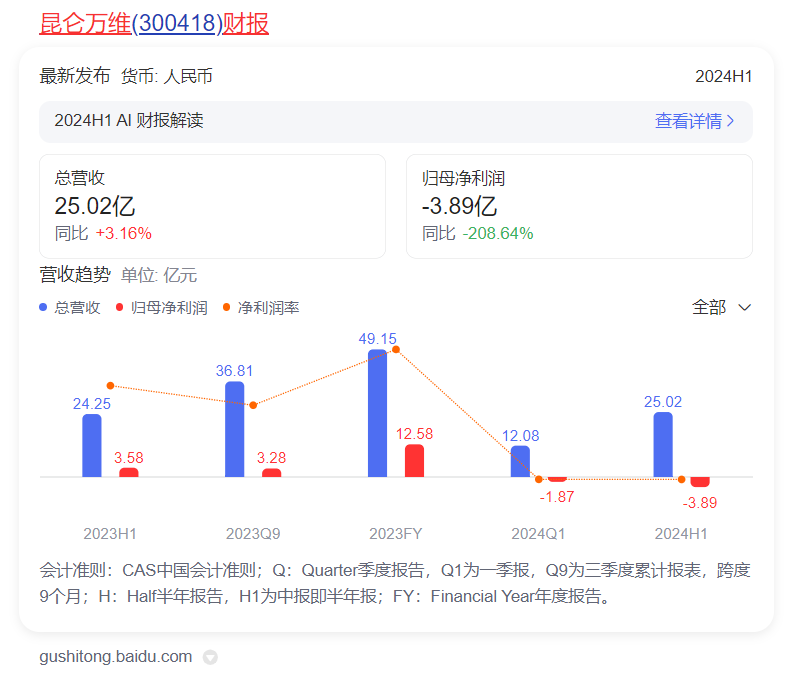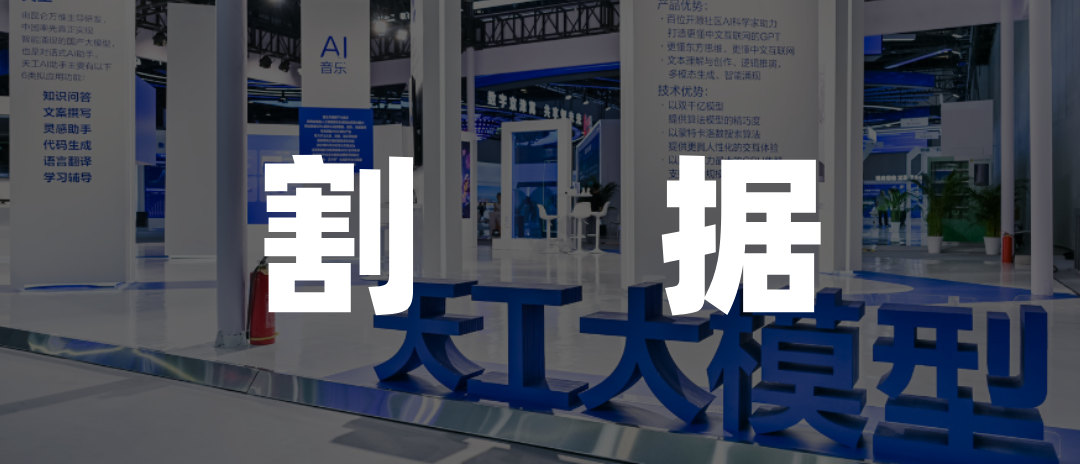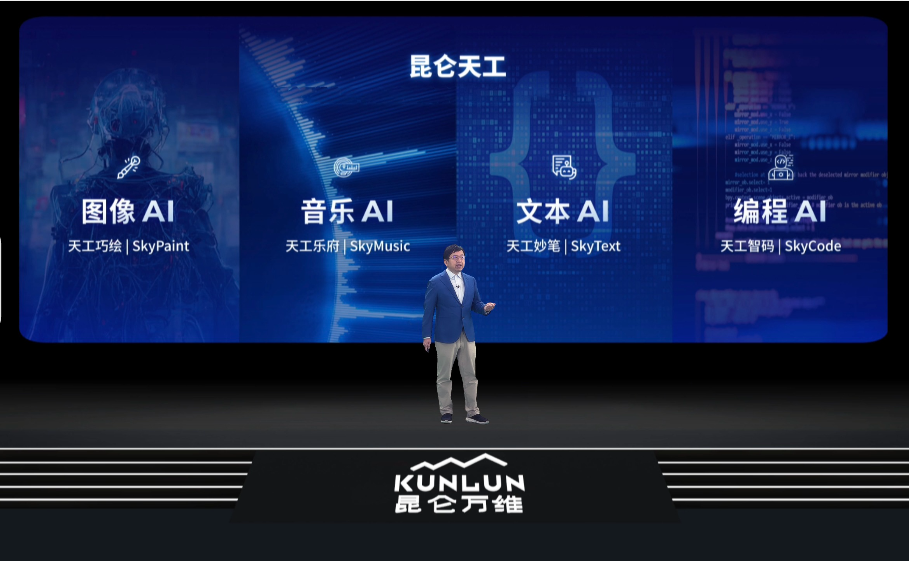Kunlun Wanwei bets big on All in AGI
![]() 08/30 2024
08/30 2024
![]() 545
545


Behind Kunlun Wanwei's diverse AI business matrix, the company has been criticized for spreading its resources too thin across various sectors without a clear focus due to insufficient R&D investment. Additionally, it has frequently faced backlash from investors for its lack of strategic focus and tendency to chase after hot trends.
With great power comes great responsibility. In early 2023, Kunlun Wanwei boldly announced its intention to go “All in” on AGI and AIGC, setting it as its strategic goal for the next decade. This represents a significant gamble for Kunlun Wanwei's future, with the Tiangong AI platform serving as the key lever for applying AI technology.
According to Kunlun Wanwei's official website, its Tiangong AI-based business covers a diverse AI business matrix encompassing AI large models, AI search, AI gaming, AI music, AI social, and AI short videos.
However, Kunlun Wanwei, which originally gained prominence through gaming, has faced criticism from investors for lacking a clear focus and frequently switching tracks to chase hot trends. Consequently, industry insiders question the sincerity behind Kunlun Wanwei's latest "All in" bet on Tiangong AI, given its history of chasing trends.
Part.1
Is the cost of betting on Tiangong AI too high?

Externally, Kunlun Wanwei has consistently portrayed itself as an AI technology company with a complete industrial chain spanning computing power infrastructure, large model algorithms, and AI applications. The aforementioned search, gaming, music, social, and short video sectors represent the practical applications of its AI technology, presented to users through the Tiangong AI website and app.
However, Tiangong AI's comprehensive coverage of popular sectors has come at a steep cost due to its commitment to AGI and AIGC. This is evident in Kunlun Wanwei's transition from profitability before 2023 to a loss position starting in 2024, following its full commitment to Tiangong AI.
According to Kunlun Wanwei's latest financial report for the first half of 2024, the company recorded revenue of RMB 2.502 billion, a year-on-year increase of 3.16%. However, net profit attributable to shareholders fell to a loss of RMB 389 million, compared to a profit of RMB 358 million in the same period last year, marking a decline of 208.64%. Non-recurring profit also fell to a loss of RMB 407 million from a profit of RMB 312 million in the previous year.

Image source: Baidu Gushitong, Kunlun Wanwei's financial report for the first half of 2024
Quarterly breakdown shows that in Q1 2024, Kunlun Wanwei recorded revenue of RMB 1.21 billion and a net loss of RMB 187 million, compared to a net profit of RMB 212 million in the same quarter last year, representing year-on-year declines of 0.8% and 188.83%, respectively. In Q2 2024, while revenue increased by 7.14% year-on-year to RMB 1.294 billion, net profit fell sharply by 238.04% year-on-year to a loss of RMB 202 million.
It is evident that Kunlun Wanwei's loss widened significantly in Q2 2024 compared to Q1.
This is attributed primarily to the company's increasing R&D investment in Tiangong AI. The interim report reveals that Kunlun Wanwei continued to pursue its "All in AGI and AIGC" strategy, with R&D expenses reaching RMB 757 million in the first half, up 115.72% year-on-year.
Furthermore, Kunlun Wanwei's revenue in the first half of 2024 was primarily derived from overseas markets, accounting for 88.16% of total revenue. This is attributed to the company's diverse business portfolio spanning information distribution, metaverse, entertainment, and social media, with nearly 400 million monthly active users globally and a 75% share of overseas revenue.
While Kunlun Wanwei leverages Tiangong AI to compete with major AI technology giants in China, Tiangong AI has yet to significantly contribute to the company's financial performance.
Notably, compared to domestic AI giants like Baidu and SenseTime, some AI companies have already commercialized their large model technologies, widening the gap between Kunlun Wanwei and these competitors in market share.
According to AI Quick News from the Daily Economic News, consulting firm IDC recently released a report stating that the Chinese large model platform market reached RMB 1.765 billion in 2023. Baidu Smart Cloud led the market with a 19.9% share, followed by SenseTime with 16%, and Zhipu AI ranking third among startups in 2023. Other notable players include Baichuan Intelligence and Fourth Paradigm.
Despite Kunlun Wanwei's bold claim of "All in AGI and AIGC," it failed to secure a spot on the list, highlighting its current predicament.
Part.2
AI Search Faces Challenges Amidst Giant Competition

The recent surge in AI large models has accelerated the evolution of AI concepts, with many companies claiming that AI can revolutionize their industries. Consequently, AI-powered products like AI phones and AI search engines have emerged.
Within Tiangong AI's business portfolio, AI search holds a prominent position, with its search bar prominently featured on the Tiangong AI website and app.

Image source: Screenshot from Tiangong AI's official website homepage
Undeniably, Tiangong AI search and similar products offer an advanced and efficient alternative to traditional search engines by presenting users with the most relevant results instead of overwhelming them with multiple options to sift through.
Global research and consulting firm Gartner echoed this sentiment in a February 2023 report, predicting that traditional search engine queries could decrease by 25% by 2026.
However, according to the First Financial News, a comparative analysis of AI search engines like Quark, Baidu, Tiangong AI, and Perplexity (a favorite of NVIDIA CEO Jensen Huang) revealed that while each has its strengths, none offered a perfect experience. Users often needed to refine their searches by changing keywords to find satisfactory results.
On the positive side, AI search products carry significant market expectations from both users and investors due to their advanced concepts. Evidence suggests that these products are gaining traction, with Tiangong AI surpassing 1 million daily active users (DAU) in May 2023 and Myta AI Search recording 7.21 million visits in March 2023, a 551% year-on-year increase.
Perplexity, an AI search engine founded in 2022, has secured USD 250 million in funding from SoftBank's Vision Fund 2, valuing the company at nearly USD 3 billion. It is seen as a potential contender to challenge Google's dominance in search.
Despite the intense competition, there is limited data to support the impact of AI on traditional search giants' commercialization and market share growth.
For instance, Microsoft's integration of ChatGPT technology into Bing in February 2023 and Google's launch of its new search experience at the I/O developer conference in May 2023 aimed to counter AI competitors like ChatGPT. However, latest data shows that AI's influence on traditional search engines remains minimal.
According to StatCounter Global Stats, Google and Bing held market shares of 91.61% and 3.38%, respectively, in December 2023, indicating a slight decline from their 2022 shares of 92.42% and 3.45%. This suggests that some of their lost market share may have shifted to emerging AI search players. As for Tiangong AI search, it faces competition from both traditional search giants and AI-powered startups, with an uncertain future outcome.
Given that traditional search giants possess robust AI capabilities, Tiangong AI's chances in the AI search market remain uncertain.
Part.3
'Spreading the Net Widely': Where Lies the Strategic Focus?

As mentioned earlier, with AI large models as its technological foundation, Tiangong AI has established a comprehensive presence across various popular sectors. However, the question remains: amidst this widespread deployment, has Tiangong AI identified key areas for focused development?
On August 8, Finance AI Telegram reported that an investor asked Kunlun Wanwei on an interactive platform about its strategy for the next six months to a year, given its slogan "All in AIGC & AGI." The investor noted that Kunlun Wanwei has numerous AI-related business lines, such as AI gaming, AI music, and AI anime, but questioned the company's current focus.
In response, a Kunlun Wanwei spokesperson stated that the company has established a diverse AI business matrix encompassing AI large models, AI search, AI gaming, AI music, AI social, and AI video. The company has launched Tiangong AI Assistant, a free-to-use large language model AI application with MoE architecture targeting C-end users, and multiple AI products like Club Koala and Linky for overseas markets. Kunlun Wanwei plans to continue leveraging its strengths to develop more high-quality AI products that meet global demand.

Kunlun Wanwei's official response underscores its unwavering commitment to its AI strategy.
However, industry standards often measure an AI company's technological strength through its R&D investment. While Kunlun Wanwei adopts an aggressive strategic approach, its actual R&D investment appears conservative, raising doubts about its technological prowess.
Despite doubling its R&D expenses in the first half of 2024 and allocating 30% of its revenue to R&D, reflecting its emphasis on AI technology, Kunlun Wanwei's R&D budget of less than RMB 1 billion still pales in comparison to that of other AI giants.
For instance, Baidu invested RMB 11.252 billion in R&D in the first half of 2024, while SenseTime, despite a smaller revenue scale than Baidu, invested RMB 3.466 billion.
While it's unclear how much of these investments went into AI large models, all these companies have publicly stated that AI large models are a top priority. Considering the substantial costs associated with hardware, data, software, human resources, R&D, optimization, commercialization, and risk management, Tiangong AI's catch-up efforts in R&D investment still lag behind those of leading AI players.
This implies that Tiangong AI faces increasing challenges and pressures to narrow the technological gap with top players.
As a legendary figure in the venture capital circle, Kunlun Wanwei's founder Zhou Yahui is known for his agility in pursuing trends. This reflects his unique perspective on entrepreneurship, as he once shared in a Forbes interview: "I believe time is the most valuable asset. For individuals, profitability is not the primary concern; rather, it's essential not to waste time and focus on creating world-class products aligned with one's original aspirations."
Kunlun Wanwei, which has pursued trends in metaverse, renewable energy, AIGC, ChatGPT, and more, may indeed be driven by Zhou Yahui's relentless pursuit of excellence and refusal to settle for mediocrity.
In September 2023, Kunlun Tech even divested its Beijing Lvfan New Energy subsidiary, which was interpreted by the market as a comprehensive abandonment of its energy storage business and a focus on its “All in AIGC&AGI” strategy, thereby increasing the chances of its Tiangong AI winning. However, as the AI race becomes increasingly competitive, Kunlun Tech's “all-in” approach may be a risky move.
Tiangong AI's business covers a diverse AI business matrix consisting of AI large models, AI search, AI games, AI music, AI social networking, and AI short dramas. However, due to insufficient R&D investment, it has been criticized for spreading its efforts too thin without a clear focus. It has also faced criticism from investors for its lack of strategic focus and its tendency to chase “hot topics.” Despite its aggressive stance, Tiangong AI may still need to further refine its strategy to overcome challenges and stand out.
Fortunately, through Tiangong AI, Kunlun Tech has taken a solid step towards AI productization and commercialization. While many players face obstacles in AI commercialization, Tiangong AI has identified numerous popular tracks and is closer to generating revenue.
It is foreseeable that as the company transitions from profitability to loss since 2024, Tiangong AI may slow down its development due to a lack of self-sustainability. While future entrants to the industry may rely on differentiated strategies to catch up and even create new possibilities in each segment, as Zhou Yahui mentioned, time is of the essence. The AI race is highly competitive, and there may not be much time left for Tiangong AI.
From this perspective, Kunlun Tech's bet on AI through Tiangong AI is indeed more like a “big gamble.”
Reference materials:
1. “Kunlun Tech Founder Zhou Yahui: Creating World-Class Products” Morning News
2. “After Selling New Energy Assets, Kunlun Tech Plans to Invest 680 Million Yuan in AI High-Computing Power” Securities Daily
3. “Traditional Search Engines Rush to Join, but AI Search is Still Not a Good Business” China Business News
4. “Kunlun Tech Doubles R&D Expenses in the First Half of the Year, How is its AI Business Progressing?” Jiemian News







